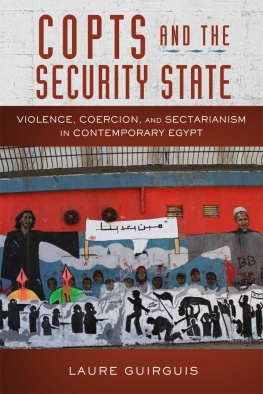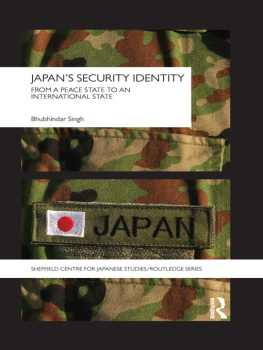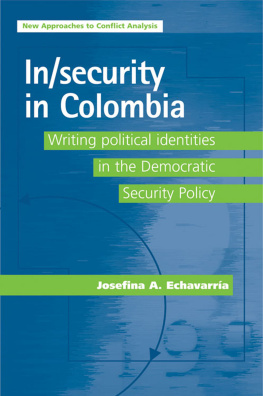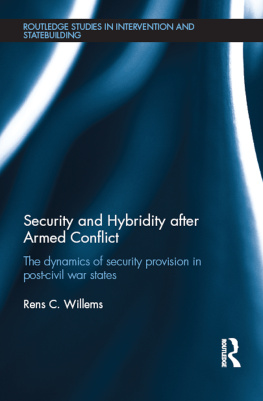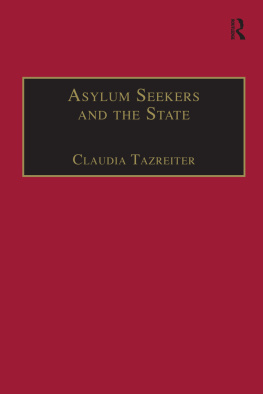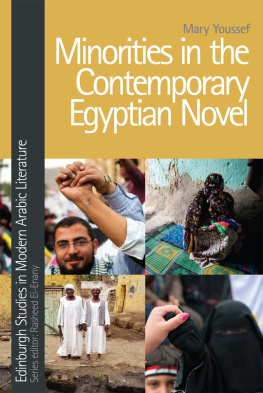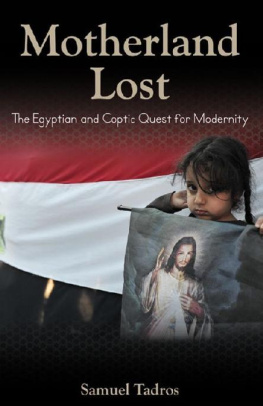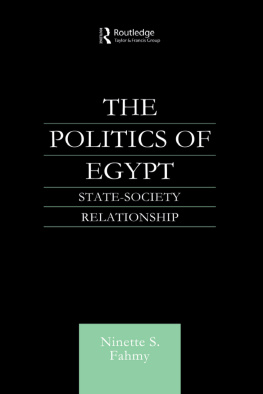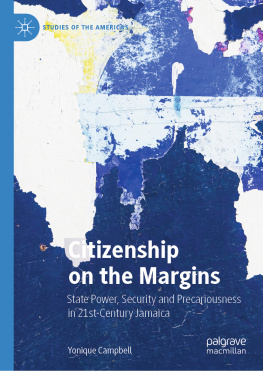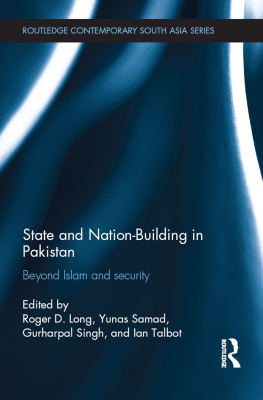Stanford University Press
Stanford, California
English translation 2017 by the Board of Trustees of the Leland Stanford Junior University.
All rights reserved.
A version of this work was originally published in French in 2012 under the title Les Coptes dEgypte: Violences communautaires et transformations politiques (20052012) [Egyptian Copts: Sectarian Violence and Political Transformations (20052012)] 2012, Editions KarthalaParis.
No part of this book may be reproduced or transmitted in any form or by any means, electronic or mechanical, including photocopying and recording, or in any information storage or retrieval system without the prior written permission of Stanford University Press.
Printed in the United States of America on acid-free, archival-quality paper
Library of Congress Cataloging-in-Publication Data
Names: Guirguis, Laure, author.
Title: Copts and the security state : violence, coercion, and sectarianism in contemporary Egypt / Laure Guirguis.
Other titles: Coptes dEgypte. English
Description: Stanford, California : Stanford University Press, 2016. | Series: Stanford studies in Middle Eastern and Islamic societies and cultures | Originally published in French in 2012 under the title Les coptes dEgypte. | Includes bibliographical references and index. | Description based on print version record and CIP data provided by publisher; resource not viewed.
Identifiers: LCCN 2016021295 (print) | LCCN 2016020170 (ebook) | ISBN 9781503600805 (e-book) | ISBN 9780804798907 (cloth : alk. paper) | ISBN 9781503600782 (pbk. : alk. paper) | ISBN 9781503600805 (ebook)
Subjects: LCSH: CoptsPolitical activity. | CoptsGovernment relations. | Coptic ChurchPolitical activity. | EgyptPolitics and government1981-
Classification: LCC DT72.C7 (print) | LCC DT72.C7 G8413 2016 (ebook) | DDC 323.1193/2dc23
LC record available at https://lccn.loc.gov/2016021295
Typeset by Bruce Lundquist in 10/14 Minion Pro
ACKNOWLEDGMENTS
It took me years of running away to be drawn back to Egypt and the Middle Eastern turmoil at the turn of the twenty-first century. After writing a masters thesis on art, ideology, and resistance in the philosophy of Theodor W. Adorno, and carrying out studies in Chinese language and civilization, focused mainly on philosophic and aesthetic literature, I traveled to Cairoa short trip but, as I had not been to Egypt since 1992, a decisive step forward that had important consequences for me. A new culture of protest seemed to be surfacing in Egypt at that time. I ultimately decided to pursue my reflection on coercion, power, and resistance in a Middle Eastern context. But when Professor Alain Roussillon suggested that I devote my research to the Coptic issue, which was arising anew in the limelight, I reacted negatively: No, anything but the Copts. He convinced me that my own concerns with power and resistance, state coercion, and political change could open a path to rethink the sectarian problem in Egypt, which, at that time, remained entangled in debates on minorities and Islam. I first wish to thank him here, as well as my supervisor, Professor Hamit Bozarslan, who has paid sustained attention to my research and advised and encouraged me with extraordinary patience and great generosity.
In conducting this research, I benefited from the double advantage of a familiarity with the Egyptian and Coptic landscapes, thanks to which I could guess the unspoken, and understand implicit rules, while my externality permitted me to maintain the indispensable distance of the observer. Being in contact with people from a wide variety of social and geographic backgrounds, from the villages of Upper Egypt to the intellectual and political circles of the capital, I took into account a diversity of experiences and points of view; observations and informal discussions often remain the most reliable way to collect materials on this sensitive issue in an authoritarian situation. I nevertheless also undertook interviews on a regular basis with certain people. In several cases, out of respect for the anonymity of the individuals I was interviewing, I have not cited their names (for example, concerning religious conversions). I am grateful to all those I met during my research and who accorded me their time and attention for discussions or interviews.
This research refers to a good deal of excellent academic research written in Arabic by Egyptian scholars, such as the studies of Nabil Abd al-Fattah on the relations between religious institutions and the state or the texts of Sherif Younes on the Nasserist regime and the paradoxes of modernity. The various exchanges with Egyptian researchers, activists, lawyers, and journalists, among other public personalities, have not only provided me with an array of testimonies, information, and documents but have allowed me to always further my reflections, to constantly challenge, question, and untangle what is commonly regarded as truth. I am especially grateful to Samer Soliman, Mounir Megahed, Nabil Abd al-Fattah, Tewfik Aclimandos, Sherif Younes, Kamal Zakher, Samir Morcos, Mohamed El-Baz, Adel Guindy, William Wissa, Muhammad Afifi, Emad Thomas, Basma Moussa, Anwar Moghith, Peter and Ramses Naggar, Yara Sallam, Husam Tammam, Atef Gendy, Rafiq Habib, Bahey eldin Hassan, Magdi Khalil, Hani Labib, Khaled Ali, Husam Bahgat, Nader Choukri, Samih Fawzi, Butros Butros Ghali, Nabil Ghubrial, Naguib Ghubrial.
This research also relies on the testimonies of prominent figures in the Egyptian press (Musa Sabry, Muhammad Hasanayn Haykal, Samih Fawzi, Usama Salama), on a great number of post-2005 texts published by journalists, Muslim Brotherhood authors (or those close to the Brotherhood), independent or activist Coptic authors, a variety of public figures, and the reports of NGOs and associations (a literature that remained largely unexplored). It draws heavily on gray literature: tracts, publications of associations and activists, national and communitarian written and audiovisual presscertain papers that are only distributed within the confines of the church (like al-Tariqa and al-Katiba al-Tibiyya), videos and films broadcast in Coptic circles. I systematically reviewed the leading Egyptian newspapers between 2006 and 2011.
This book would not have seen the light of day without the lively exchanges with several colleagues, through informal caf discussions, as well as through seminars and conferences: Mona Abaza, Febe Armanios, Dominique Avon, Joel Beinin, Sarah Ben-Nfissa, Nathalie Bernard-Maugiron, Laurent Bonnefoy, Bernard Botiveau, Patrice Brodeur, Virginie Collombier, Fanny Colonna, Grgoire Delhaye, Blandine Destremeau, Marie Duboc, Baudouin Dupret, Gatan Du Roy, Souad Ferri, Sverine Gabry, Aurlien Girard, Patrick Haenni, Chaymaa Hassabo, Bernard Heyberger, Franois Ireton, Lina Khatib, Mustapha Khayati, Elisabeth Longuenesse, Dina Makram-Ebeid, Jacques Masson, Marlene Nasr, Didier Monciaud, Jean-Jacques Prenns, Olivier Roy, Giedre Sabaseviciute, Jihane Sfeir, Jana Tamer, Thomas Scheffler, and Nelly Van Doorn-Harder, among others.
My thanks also go to the institutions that financially or logistically supported realizing the translated version of this book: the Centre dtudes et de recherches internationales (CRIUM); the Canada Research Chair in Religious Pluralism and Ethnicity; and the Canada Research Chair in Islam, Pluralism, and Globalization at the University of Montreal; as well as to the associations LOeuvre dOrient and Solidarity-Orient.

